The EU just passed an anti-AI law.
Some of it is ostensibly restricting government and corporate use of the technology, and is hard to argue with if it means what it says (it doesn’t).
RT:
The new rules ban certain AI applications that threaten the rights of citizens, such as biometric categorization systems based on sensitive characteristics and untargeted scraping of facial images from the internet or CCTV footage to create facial recognition databases. Emotion recognition at workplaces and in schools, social scoring, predictive policing (when it is based solely on profiling a person or assessing their characteristics), and AI that manipulates human behavior or exploits people’s vulnerabilities will also be forbidden.
The AI Act also prohibits in principle the use of biometric identification systems (RBI) by law enforcement, except in exhaustively listed and narrowly defined situations. ‘Real-time’ RBI can only be deployed if strict safeguards are met.
That doesn’t sound like it actually prevents RBI, actually.
The rest of the law is just nonsensical Luddite moronism.
The EU is calling on eight major tech companies including Google, Facebook and X to detail how they identify and tackle deepfake material amid concerns about the use of the technology to influence elections.
In a world first they will be using new laws on artificial intelligence to force companies to root out fake video, imagery and audio.
That’s not going to be possible in a year from now.
It’s arguably not even possible now. But within a year, there will be no way at all to identify a deepfake other than maybe through some chain of custody system which social media companies couldn’t possibly implement (the only people who could do chain of custody, in theory, would be a court that could seize the devices used to produce the fakes).
Companies have until 5 April to show how they will deal with last-minute high impact fake news being dumped on social media, amid evidence that foreign agents including those from Russia are building up “sleeper” accounts to be deployed on the eve of elections.
…
The eight companies which have been asked to provide more information on their ability to spot faked AI content are Bing, Google Search, Facebook, Instagram, Snapchat, TikTok, YouTube, and X.
Officials noted that not all AI content, which also has be labelled as fabricated material under the new EU AI Act, was harmful but that they needed to signal to all tech companies that the new laws were now in place.
Although there have been few major instances of such technology being used for political ends, X, came under particular fire for its failure to prevent the proliferation of a series of pornographic deepfakes of singer Taylor Swift earlier this year.
…
The EU said it would be creating an “enforcement ecosystem” along with regulators in 27 member states to send messages out to all the platforms that fake material is now illegal under the Digital Services Act.
“Fake material is now illegal”? What does that sentence mean?
I haven’t read the law. I hate reading laws. I will do it at some point. Actually, I will probably wait for someone I trust on Substack to do it. The people writing the news have no idea what any of this stuff even means. I doubt the people who wrote the law do either. But all fake material is not illegal; that is impossible and doesn’t make sense.
All this law amounts to is “if we say it’s fake, it’s fake, and you have to remove it from the internet.”
Do you remember when the social media companies were forced by the government to remove the Hunter Biden laptop story because it was declared by lying intelligence agencies to be “Russian disinformation”?
Remember when it turned out it was actually real, and the government lied in order to remove a damning story about Joe Biden from the internet?
I remember that.
Yes, of course people are going to be making fake videos. Of course some of them will be for political purposes. But that’s just the reality we’re dealing with now, and if people are too stupid to figure out what is real and what isn’t, they shouldn’t be voting in the first place. This cannot be stopped.
What is much more concerning than anti-government people making fake videos is the government itself making fake videos and saying they’re real, as well as using this law (and others like it) to remove real videos, claiming they’re fake.
🚨BREAKING: The European Parliament has just APPROVED the AI Act. What everyone should know:
➵ The AI Act follows a risk-based approach. Some AI systems are banned, such as those involving:
– Cognitive behavioral manipulation of people or specific vulnerable groups;
– Social… pic.twitter.com/JiaA8qXEGx— Luiza Jarovsky (@LuizaJarovsky) March 13, 2024

